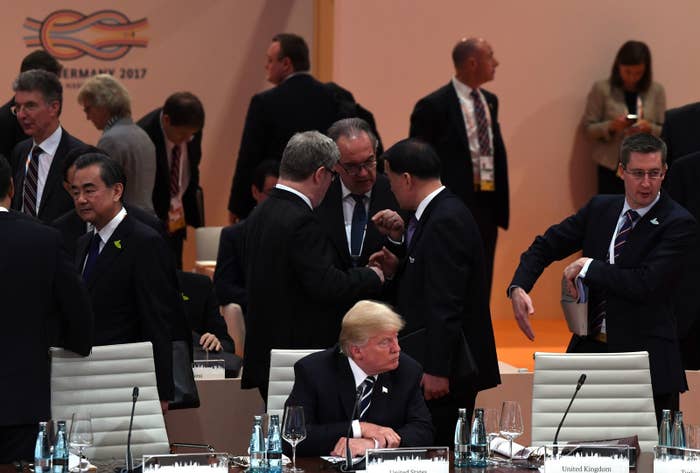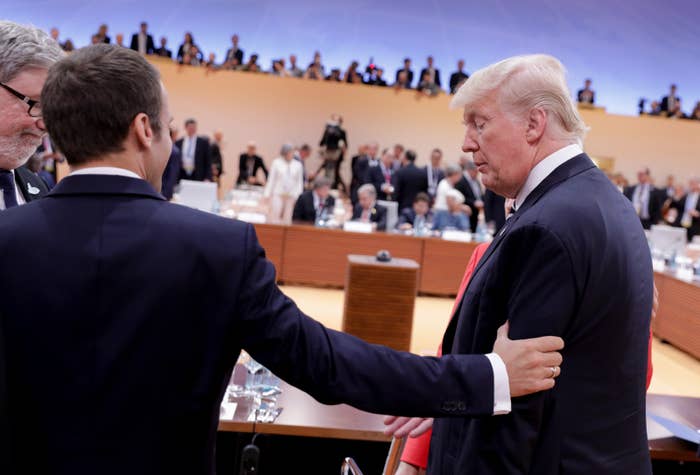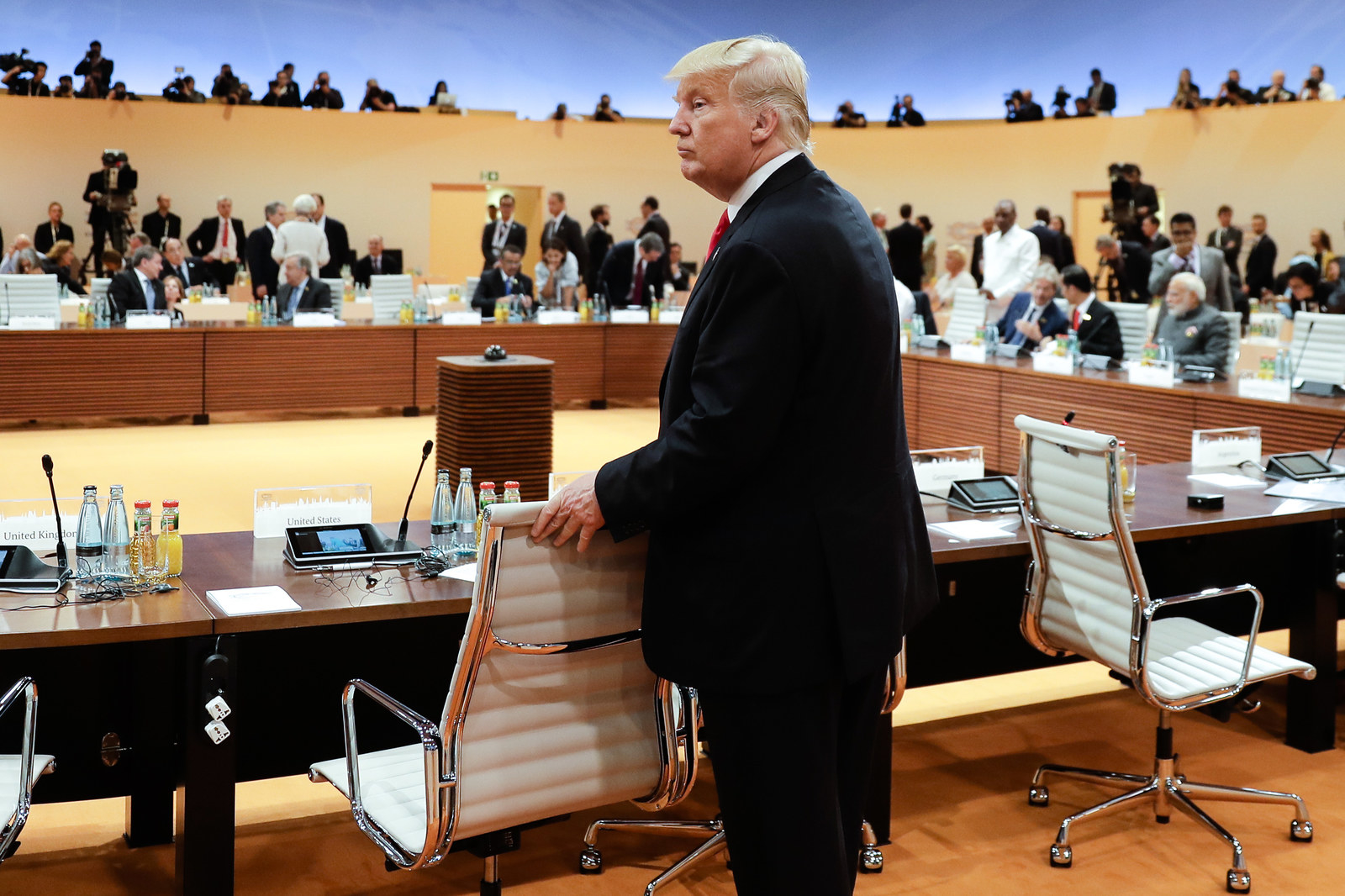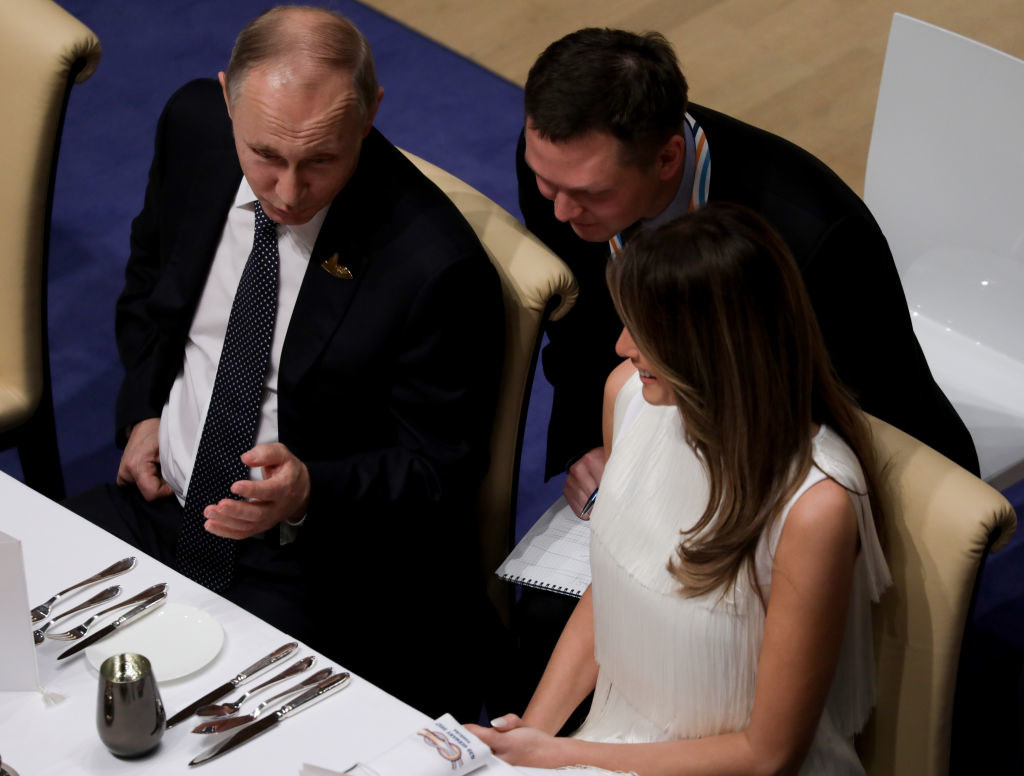
The leaders of 19 of the world’s 20 largest economies have reaffirmed their commitment to the Paris climate accords, putting on record their differences with US President Donald Trump's administration.
A communiqué issued at the end of the G20 summit in Hamburg, Germany, notes the "decision of the United States of America to withdraw from the Paris Agreement."
"The Leaders of the other G20 members state that the Paris Agreement is irreversible," the statement says.
Despite agreement among the 19 countries, the section on climate action was among the last issues to be closed by negotiators on Saturday morning, BuzzFeed News understands.
The US had been pushing to include a reference to how the “USA will endeavour to work closely with other partners to help their access to and use of fossil fuels..."
A source close to the talks told BuzzFeed News that the French government was strongly opposed to this suggested wording.
The source said French President Emmanuel Macron voiced a strong defence of globalisation and the need to cooperate. The source said Macron told his fellow leaders that countries needed to take responsibility to provide concrete answers to global problems in the only way possible: by collaborating.
Macron later announced that France would host a new summit on tackling climate change on Dec. 12.

German Chancellor Angela Merkel called climate and energy "the one crucial issue" at the G20 and spoke of her frustration at the US choosing to leave the Paris accord.
"You know that the US, unfortunately, left the climate agreement — or have said that they want to," said Merkel.
(An earlier translation of her statement shown on news channels said Merkel said she "deplore[s]" the US decision, but BuzzFeed Germany updated the translation.)
"But I am very gratified to note that the other 19 member states of the G20 say that the Paris agreement is irreversible," said Merkel.
Angela Merkel on the US leaving the Paris Accord: "I deplore this"
The agreed G20 statement reads: “The United States of America states it will endeavour to work closely with other countries to help them access and use fossil fuels more cleanly and efficiently and help deploy renewable and other clean energy sources, given the importance of energy access and security in their nationally-determined contributions."
A European official close to the talks said: "The Americans will be happier with the wording than we are."
The same official said a number of the 19 governments were “secretly satisfied” with the impasse because they were keen to use Trump’s decision to pull out of the Paris accords as a way of watering down commitments related to cutting emissions.
The joint statement indicates the US is the only country to not sign onto the separate "G20 Hamburg Climate and Energy Action Plan for Growth," a roadmap for how the top economies will cooperate on climate action.
In the action plan, the participating countries committed "to move forward to implement" their current and future emissions reduction goals in line with the Paris agreement. They also went on record encouraging all nations to develop plans for responding to climate change through at least 2050, agreed to start developing a program this year with the World Bank to share best practices on climate adaption between nations, and more.
"On the overall outcome, the most important thing is that all other 19 leaders signed onto the G20 Climate and Energy Action Plan for Growth," former State Department official Andrew Light wrote in an email to BuzzFeed News. "It is a clear indication that the US has isolated itself on climate change once again, and is falling back while all other major economies step up and compete in the clean energy marketplace." Light is now a senior fellow working on climate issues at the World Resources Institute.

Climate change was not the only issue where leaders were divided in Hamburg.
Opening the G20 on Friday, summit host Merkel told her fellow leaders: “Solutions can only be found if we are willing to compromise — without, however, and I would like to emphasise this, having to bend too much."
Speaking to reporters later in the day, the chancellor described the discussions as “very difficult.”
“I don’t want to talk around that,” Merkel said.
Negotiators tasked with drafting the final statement were eventually able to find a compromise on the language to use on trade in the early hours of Saturday morning.
Going into the G20 summit, European negotiators told BuzzFeed News the US was backtracking on positions agreed by the president less than six weeks ago at the G7 summit in the Sicilian town of Taormina. It was seeking to redefine stock wording on fighting protectionism, pushing back on long-held positions and fundamental global principles such as the rules-based multilateral trading system, and angling to put bilateral trading arrangements on the same level as an international system anchored on the World Trade Organization.
The statement the 20 leaders agreed in Hamburg mostly reflects key principles agreed in Taormina, an official close to the talks said, while pledging to “keep markets open noting the importance of reciprocal and mutually advantageous trade and investment frameworks and the principle of non-discrimination, and continue to fight protectionism including all unfair trade practices and recognize the role of legitimate trade defence instruments in this regard.”
The addition of caveats to the fight against protectionism will be seen as weakening the usual anti-protectionism position of international meetings.
One of the most contested passages, regarding the very definition of the global trade order, says: “We underline the crucial role of the rules-based international trading system. We note the importance of bilateral, regional and plurilateral agreements being open, transparent, inclusive and WTO-consistent, and commit to working to ensure they complement the multilateral trade agreements.”
The wording adopted is close to a compromise proposed by hosts Germany on the eve of the summit.
Still, not all G20 states will be happy with the compromise, pointing out that the US is in effect watering down the long-established global consensus that has underpinned international trade for decades.
But the most difficult part of the discussions rotated around excess capacities, and stark tensions between the US and China. President Trump has been threatening to take action on what he views as unfair trade practices for months, often using Twitter to rant against issues ranging from “steel and aluminium dumping” by China to Germany’s “massive” trade surplus.
In the lead-up to the summit US negotiators were vying to include references to both unilateral and global instruments to tackle the negative impact of excess capacity.
But the final text does not make direct reference to a unilateral approach, and sets out a timeline to deal with the issue:
Recognising the sustained negative impacts on domestic production, trade and workers due to excess capacity in industrial sectors, we commit to further strengthening our cooperation to find collective solutions to tackle this global challenge. We urgently call for the removal of market-distorting subsidies and other types of support by governments and related entities. Each of us commits to take the necessary actions to deliver the collective solutions that foster a truly level playing field. Therefore, we call on the members of the Global Forum on Steel Excess Capacity, facilitated by the OECD, as mandated by the Hangzhou Summit, to fulfill their commitments on enhancing information sharing and cooperation by August 2017, and to rapidly develop concrete policy solutions that reduce steel excess capacity. We look forward to a substantive report with concrete policy solutions by November 2017, as a basis for tangible and swift policy action, and follow-up progress reporting in 2018.
European governments are worried that any unilateral action by the US could see the EU caught in the crossfires of a trade war with China, or European companies damaged by the introduction of a border tax on imports.
The EU has made clear it would immediately respond with legal action, and other countermeasures, should a US initiative harm its exports.
A third area of contention going into the summit was immigration. Officials feared that Trump’s controversial views would add a tricky dimension to discussions about refugees.
On the one hand, the US and a number of other governments, including the UK, were pushing for a hard line on migration and border controls to be included in the final G20 statement. On the other, the Italian government was arguing for a clear differentiation between emergency action and longer-term measures, and, in regards to the former, a looser distinction between economic migrants and displaced people.
In a diplomatic win for the Italian government, the agreed compromise spells out both distinctions, as well as include a reference to transit countries the government was also aiming for:
The world is experiencing historic levels of migration and forced displacement. While migration is influenced by many political, social and economic developments, the main drivers of forced displacement include conflicts, natural disasters as well as human rights violations and abuses. Migration and forced displacement trends are of major relevance for countries of origin, transit and destination. The social and economic benefits and opportunities of safe, orderly and regular migration can be substantial. Forced displacement and irregular migration in large movements, on the other hand, often present complex challenges.We support those countries that choose to develop pathways for migration, underline the importance of nationally determined integration and endorse the G20 Policy Practices for the Fair and Effective Labour Market Integration of Regular Migrants and Recognized Refugees. We emphasise the sovereign right of states to manage and control their borders and in this regard to establish policies in their own national interests and national security, as well as the importance that repatriation and reintegration of migrants who are not eligible to remain be safe and humane. We commit to countering migrant smuggling and trafficking in human beings and we are determined to take action against people smugglers and traffickers.
We seek to address the root causes of displacement. We call for concerted global efforts and coordinated and shared actions, in particular with respect to countries and communities that are under high social, political and financial pressure, and for combining both an emergency approach and a long-term one. To this end, we acknowledge the importance of establishing partnerships with countries of origin and transit. We will promote sustainable economic development in those countries.
We commit to addressing the distinct needs of refugees and migrants, in particular close to their region of origin and, when applicable, to enable them to return home safely. At the same time, we place special emphasis on vulnerable groups, including women at risk and children, particularly those unaccompanied, and to protecting the human rights of all persons regardless of their status.
We call for improving the governance of migration and providing comprehensive responses to displacement and recognise the need to develop tools and institutional structures accordingly. Therefore, we look forward to the outcome of the UN process towards Global Compacts on Refugees and for Safe, Orderly and Regular Migration, both envisaged to be adopted in 2018. We emphasise the need for monitoring global displacement and migration, as well as its economic consequences. To this end, we ask the OECD, in cooperation with ILO, IOM and UNHCR, to update us annually on trends and policy challenges.
Much of the expectation ahead of a G20 summit, which was overshadowed by violent clashes between protesters and police, was for the first meeting between Russian President Vladimir Putin and Trump.

The US president began the meeting by asking Putin directly about Russian interference in the 2016 presidential election, US officials said. However, Putin denied Russia was responsible, and the two camps would appear to disagree on exactly what was said during the two-hour meeting.
BuzzFeed News understands that the two leaders engaged in another “long chat” right after a G20 dinner on Friday night, according to a source present.
First lady Melania Trump had been seated next to Putin at the dinner. Trump sat next to Juliana Awada, the first lady of Argentina.

Elsewhere, the leaders agreed measures to fight terrorism, a World Bank fund for the empowerment of women that had been championed by Ivanka Trump, a development and partnership plan for Africa, which was one of host Germany’s priorities, and pledged to harness digitalisation and build a resilient global financial system.
On Saturday morning after taking part in an event to present the fund, Ivanka raised eyebrows among some delegates when she sat in for her father at the start of a leaders’ working session about Africa and migration with the 19 other world leaders.
An official present told BuzzFeed News, "Incredible!!!"
Ivanka holds an official, yet unpaid, advisory position to the president.
CORRECTION
The US was the only G20 nation not to sign onto the Hamburg Climate and Energy Action Plan for Growth. A previous version of this post incorrectly said all G20 nations had signed on.


